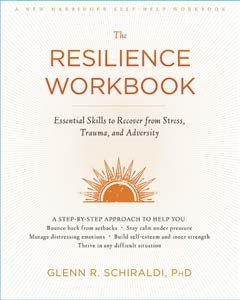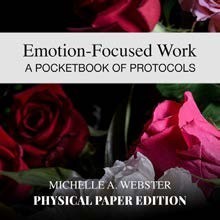NEWS AND EVENTS
{ BOOK REVIEWS }

The resilience workbook: Essential skills to recover from stress, trauma, and adversity
By Glenn R Schiraldi
Reviewer
Kerrie Gaelen
The resilience workbook by Glenn R Schiraldi has many dedications from scholarly people on its advantages for psychology, sports, the workplace and life, attesting to its comprehensive and authoritative applications for readers – and I agree with their sentiments.
Shiraldi describes resilience and its importance and benefits for anyone struggling with conditions such as posttraumatic stress disorder, substance abuse and eating disorders, attention-deficit/ hyperactivity disorder, suicidal thoughts, self-harm, depression and many other mental health disorders. He talks about the impact of trauma – particularly unresolved trauma.
The questionnaire in the introductory section allows users to gain insight into their resilience levels and outlines areas in which the reader could expect to notice measurable change throughout their journey. He encourages readers to focus on the pros and cons of building resilience and on building motivation and commitment.
The book is packed with easily accessible information, including on how to build a healthy life. Schiraldi delves into arousal and stress, and the impact on the body and the workings of the brain when things go wrong. He explores the impact of regular exercise, and includes a table outlining healthy eating and principles of good sleep.
The workbook takes the reader through a number of breathing and relaxation exercises, and covers mindfulness, self-compassion, expressive writing, and managing and understanding distressing dreams. Shiraldi clearly describes eye movement desensitisation and reprocessing and tapping exercises and the theory around how they work. He discusses thought processes/ distortions and core beliefs that feed our thoughts and the impact this has on our overall wellbeing. He also outlines realistic happiness and optimism goals while encouraging building meaning and purpose into our lives.
It’s difficult to give a fair representation of this workbook and its contents and the value it offers to readers of all levels. I have used some of the exercises presented with private clients, and I know the value they offer – but there is much more to learn from this workbook. Schiraldi suggests the workbook can be used as a self-help book or worked through with a therapist.
With this workbook, I can see the benefits for therapists for personal development, and I think this is a valuable addition to their practitioner’s toolkit. Shiraldi encourages the user to try each exercise at least a few times, but is realistic that each person will find the exercises that fit best for them. Throughout there are easy-to-use tables and questionnaires allowing the reader to reflect and/or understand themselves more clearly and gain insight into their progress.
It is a large tome and I initially thought its size would be offputting, but as I worked through it, I realised even its size is a strength – it stays open at the page the reader is exploring or working on.
This is an impressive workbook and is written in accessible language for all levels of understanding. It will hold a valued place in my bookshelf. ■

Photo: Pexels

Emotion-focused work: a pocketbook of protocols
By Michelle Webster
Reviewer
Loretta Bennett Level 4 ACA member, family therapist at Reset Therapy
Emotion-focused work: a pocketbook of protocols is an essential reference for therapists who centre emotion in their practice. Michelle Webster’s latest offering delivers proven frameworks and real-world protocols for therapists to apply in their everyday sessions. These practical tips are complemented with links for where to find additional information and delve deeper into each topic. This is well worth a read and will be a trusted resource for work in this area. The way it is laid out and written is so engaging, easy to read and insightful that I wanted to keep reading even when I’d (sadly) gotten to the end.
Michelle has crafted a resource book with a simple and accessible format, so the reader goes directly to a specific topic or can read the book from front to back. It is an intuitive guide through the steps, frameworks, protocols and techniques of emotion-focused work.
Each section begins with a concise introduction that will benefit anyone exploring whether emotion-focused work is a medium they want to develop or for those already experienced in this form of therapy. It provides a clear step-by-step process to work through with clients and is a great quick refresh if you need focus for planning a session. Its value as an everyday tool draws you in and leaves you curious for more.
Within each of the sections, Michelle has broken down engagement with clients in a step-by-step, session-to-session format, with information on approaches and techniques to draw on within these sessions. It is simple and informative. It is a guide and a reminder of how to work with individuals and couples using the emotion focused framework.
The compact size of the book allows it to easily fit in one’s handbag or office drawer. It may be small, but it will become an important go-to tool.
It is formatted simply and clearly, which makes it easy to read and refer to, and to find what you need in it. Whether it be for building a framework for practice or refreshing methods and techniques, I found this book invaluable. I will refer to it regularly in my practice and I highly recommend it to others. Michelle Webster has an easy way of writing that is engaging, informed and relevant, which makes it a reliable source for developing your therapeutic knowledge and skill. ■